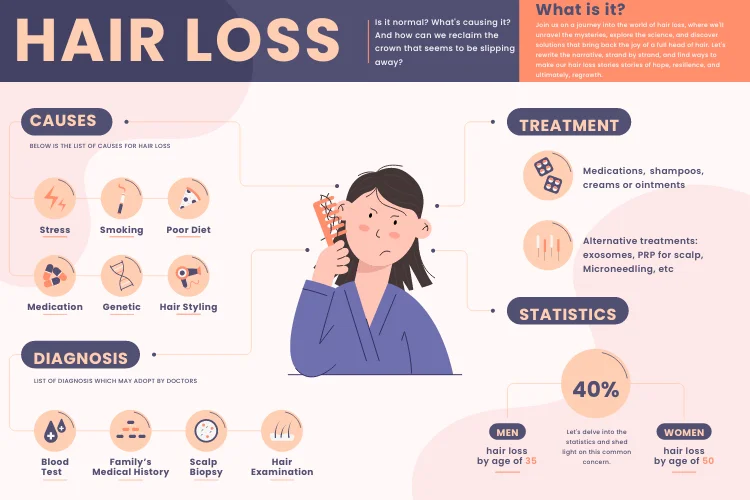Understanding Hair Loss: Exploring Causes, Treatments, and Prevention

Introduction
Hair loss, medically known as alopecia, is a common concern affecting millions of individuals worldwide. From genetics to lifestyle factors, various reasons contribute to hair loss. Understanding its causes, available treatments, and preventive measures can empower individuals to address this dermatological issue effectively.
Types of Hair Loss
- Androgenetic Alopecia (Male/Female Pattern Baldness): The most common form, characterized by a receding hairline or thinning crown, usually attributed to genetic predisposition.
- Alopecia Areata: An autoimmune condition causing patchy hair fall on the scalp or body due to the immune system attacking hair follicles.
- Telogen Effluvium: Often triggered by stress, illness, or hormonal changes, leading to excessive shedding or thinning of hair due to a disruption in the hair growth cycle.

Causes of Hair Loss
- Genetics: Family history plays a significant role in androgenetic alopecia.
- Hormonal Changes: Fluctuations in hormone levels, such as during pregnancy, menopause, or thyroid disorders, can lead to hair fall.
- Medical Conditions: Scalp infections, nutritional deficiencies, autoimmune diseases, or chronic illnesses contribute to hair fall.
Dermatological Treatments For Hair Loss
- Medications:
- Minoxidil (Rogaine): A topical solution that promotes hair growth and slows hair fall.
- Finasteride (Propecia): A prescription medication primarily for men that helps prevent further hair loss by blocking DHT, a hormone linked to baldness.
- Platelet-Rich Plasma (PRP) Therapy: Involves injecting platelet-rich plasma into the scalp to stimulate hair growth.
- Hair Transplant Surgery: Involves moving hair follicles from dense areas to thinning or balding areas for permanent restoration.
Preventive Measures
- Healthy Lifestyle: A balanced diet rich in vitamins, minerals, and proteins supports overall hair health.
- Scalp Care: Regular shampooing, gentle hair care practices, and avoiding harsh treatments can prevent further damage.
- Stress Management: Practicing stress-relief techniques helps reduce the impact of stress-induced hair fall.
Consultation with a Dermatologist
For individuals experiencing persistent or severe hair fall, consulting a dermatologist is crucial. Dermatologists can provide personalized assessments, determine the underlying causes, and recommend suitable treatments for effective management of hair fall, Experience personalized care for hair fall concerns at Derma and Dental Clinic, situated in the heart of Bahria Town, Lahore. Our expert dermatologists offer specialized consultations to address various conditions using the latest scientific insights and advanced treatments. Whether you’re seeking solutions for androgenetic alopecia, alopecia areata, or other hair-related issues, our clinic provides comprehensive evaluations and evidence-based treatments. Schedule your consultation today by calling us at 03041115000 or visit our clinic or WhatsApp Us to begin your journey towards healthier, fuller hair.”
Conclusion
Hair loss, a multifaceted concern influenced by genetic, hormonal, and environmental factors, impacts individuals globally. Through extensive scientific research, we’ve gained profound insights into the complex mechanisms underlying various types of hair fall, including androgenetic alopecia, alopecia areata, and telogen effluvium. Scientific breakthroughs have paved the way for advanced treatments such as minoxidil, finasteride, and emerging therapies like platelet-rich plasma (PRP) and low-level laser therapy (LLLT). These treatments, backed by rigorous research, offer hope and efficacy in managing hair fall by promoting regrowth and mitigating further thinning.




3 thoughts on “Understanding Hair Loss: Exploring Causes, Treatments, and Prevention”
Made to measure curtains?[…]check out the sites listed below, worth a read for interiors and rugs enthusiasts[…]?
This post is a different view at an old issue. Thank you! I am sharing this!
does delta 8 thc have cbd